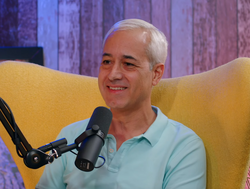Biography:Pedro Domingos
Pedro Domingos | |
|---|---|
 Domingos in 2023 | |
| Alma mater | University of California, Irvine (MS, PhD) Instituto Superior Técnico - University of Lisbon (MS, Licentiate) |
| Known for | The Master Algorithm |
| Awards | SIGKDD Innovation Award (2014) AAAI Fellowship (2010) Sloan Fellowship (2003) Fulbright Scholarship (1992-1997) |
| Scientific career | |
| Fields | Artificial intelligence Machine learning Data science |
| Institutions | University of Washington |
| Thesis | A Unified Approach to Concept Learning (1997) |
| Doctoral advisor | Dennis F. Kibler |
| Website | homes |
Pedro Domingos is a Professor Emeritus[1] of computer science and engineering at the University of Washington. He is a researcher in machine learning known for Markov logic network enabling uncertain inference.[2][3]
Education
Domingos received an undergraduate degree and Master of Science degree from Instituto Superior Técnico (IST).[4] He moved to the University of California, Irvine, where he received a Master of Science degree followed by his PhD.[4]
Research and career
After spending two years as an assistant professor at IST, he joined the University of Washington as an Assistant Professor of Computer Science and Engineering in 1999 and became a full professor in 2012.[5] He started a machine learning research group at the hedge fund D. E. Shaw & Co. in 2018,[6] but left in 2019.[7]
He co-founded the International Machine Learning Society. As of 2018, he was on the editorial board of Machine Learning journal.[8]
Publications
- Pedro Domingos, The Master Algorithm: How the Quest for the Ultimate Learning Machine Will Remake Our World, New York, Basic Books, 2015, ISBN:978-0-465-06570-7.
- Pedro Domingos, "Our Digital Doubles: AI will serve our species, not control it", Scientific American, vol. 319, no. 3 (September 2018), pp. 88–93. "AIs are like autistic savants and will remain so for the foreseeable future.... AIs lack common sense and can easily make errors that a human never would... They are also liable to take our instructions too literally, giving us precisely what we asked for instead of what we actually wanted." (p. 93.)
Awards and honors
- 2014: ACM SIGKDD Innovation Award.[9] for his foundational research in data stream analysis, cost-sensitive classification, adversarial learning, and Markov logic networks, as well as applications in viral marketing and information integration.
- 2010: Elected an Association for the Advancement of Artificial Intelligence (AAAI) Fellow.[10] For significant contributions to the field of machine learning and to the unification of first-order logic and probability.
- 2003: Sloan Fellowship
- 1992-1997: Fulbright Scholarship
References
- ↑ "Emeritus Faculty". https://www.cs.washington.edu/people/faculty/emeritus.
- ↑ Scheuermann, Christoph; Zand, Bernhard (16 April 2018). "Pedro Domingos on the Arms Race in Artificial Intelligence". Der Spiegel. http://www.spiegel.de/international/world/pedro-domingos-on-the-arms-race-in-artificial-intelligence-a-1203132.html.
- ↑ Domingos, Pedro; Pazzani, Michael (1997). "On the Optimality of the Simple Bayesian Classifier under Zero-One Loss". Machine Learning 29 (2/3): 103–130. doi:10.1023/A:1007413511361. ISSN 0885-6125.
- ↑ 4.0 4.1 Domingos, Pedro. "Pedro Domingos". https://homes.cs.washington.edu/~pedrod/.
- ↑ "Pedro Domingos | Computer Science & Engineering". https://www.cs.washington.edu/people/faculty/pedrod.
- ↑ Wigglesworth, Robin (16 August 2018). "DE Shaw taps academic to set up new machine learning group". Financial Times. https://www.ft.com/content/1553b0a2-a177-11e8-85da-eeb7a9ce36e4.
- ↑ "Curriculum Vitae". https://homes.cs.washington.edu/~pedrod/vita.pdf.
- ↑ Cantrell, Amanda (August 16, 2018). "D.E. Shaw Launches Machine Learning Unit". Institutional Investor. https://www.institutionalinvestor.com/article/2bsxkt37lw2a7tcxhqxa8/portfolio/d-e-shaw-launches-machine-learning-unit.
- ↑ 2014 SIGKDD Innovation Award: Pedro Domingos
- ↑ "Elected AAAI Fellows". aaai.org. http://www.aaai.org/Awards/fellows-list.php.
 |

